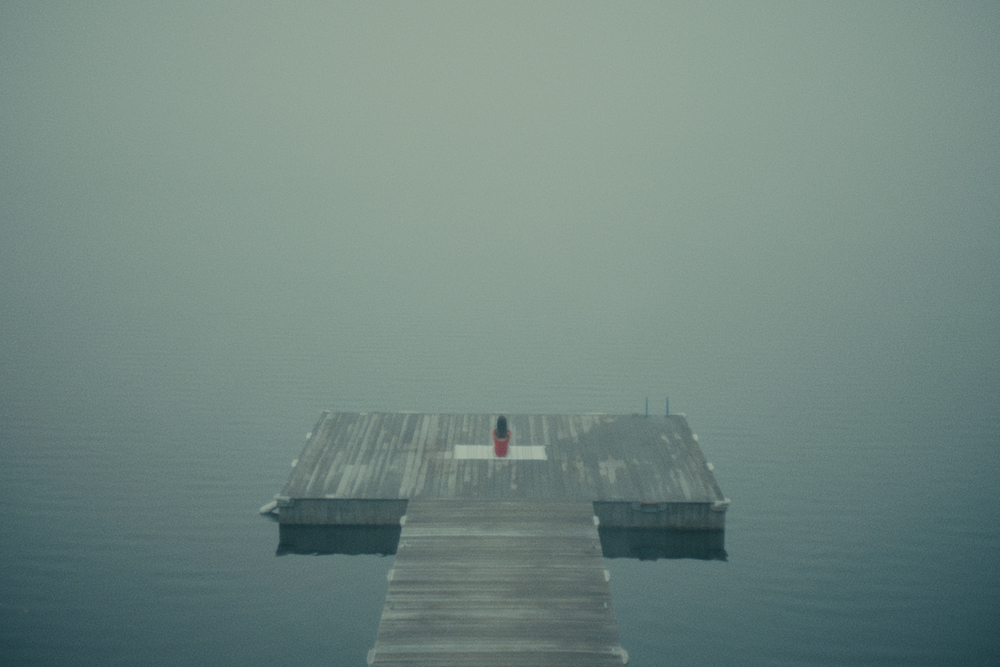Lawrence Michael Levine’s fourth feature, Black Bear, really messed with my equilibrium. I first saw the film as part of Nightstream, a collaborative virtual horror film festival, so I guess I shouldn’t be surprised that it stirred up something deep in my psyche. The plot unfolds in three distinct strands. One follows a filmmaker and former actress named Allison (Aubrey Plaza) who heads to a wooded retreat to seek inspiration for her next film while navigating the awkward tension of the cabin’s caretakers, Gabe (Christopher Abbott) and Blair (Sarah Gadon). The second departs from almost everything established by the first, picking up on the final day of shooting for a film directed by Gabe and costarring Blair, whose apparent chemistry with Gabe informs Allison’s starring performance at the cost of her sanity. The third strand involves Allison meditating by the lake in a red bathing suit. Feeling disoriented yet? Fear not. Black Bear delivers plenty of laughs from a stellar supporting cast and a career-best performance by Plaza. This cabin-in-the-woods head trip is well worth the spins. —Christopher Notarnicola
Sion Sono’s Red Post on Escher Street—now streaming online as part of the Japan Society’s 21st Century Japan film series—is a love letter of sorts, a two-and-a-half-hour film about filmmaking that follows a director named Kobayashi as he attempts to cast his latest project with unknowns, much to the consternation of his producers. Its scenes have the loose anything-could-happen feel of improvisation; its characters—a group of girlfriends, a young widow, a hilarious Kobayashi-themed fan club, a legendary and slightly pathetic movie extra, a woman whose father has just stabbed himself following their incestuous affair, and a ghost—run the gamut from silly to serious but are always interesting. It’s the last twenty seconds of the film, though, that really captured me. In those seconds, the camera suddenly turns handheld, the location switches to the famous Shibuya Crossing in Tokyo, and two actresses, in a moment of guerrilla filmmaking, launch into a speech exhorting the unsuspecting audience to not be extras in their own lives. There’s a certain quality that good art has, a sensation that it sparks within me, that I can describe only as “it makes me feel alive.” Watching those last twenty seconds of Red Post on Escher Street, pent up and cooped up in my apartment as we lurch into a full year of quarantine, I felt something click. I felt that swooning, whooping kind of happiness, of possibility, that good art makes you feel. Simply put: I felt alive. —Rhian Sasseen
In 2013 I read a short story called “Bright Winter,” by Anna Keesey, which has more or less haunted me ever since. Early in the year of 1844, a father writes letter after letter to his Adventist son, scoffing at the disorderly religious fervor that pulls at the seams of their town, pleading for him to come home with increasing sadness, and noting all the while disconcertingly warm weather. After seven years of thinking about this story, I realized I could read Keesey’s novel, Little Century, which I wolfed down in a few days. Keesey imagines a most refreshing Western in which an eighteen-year-old Chicagoan named Esther Chambers strikes out for the Oregon high desert after her mother dies. There, she decides to help her handsome older cousin with a little homesteading fraud and thus becomes embroiled in the brief but exciting life of the town of Century (est 1900). Esther won me over when her elaborate daydreams about her new frontier lifestyle on the train ended with the thought “How did one make cheese?” She knows nothing, but it’s fine—remember being eighteen? She learns a novel’s worth. Century is a hard place, but in Keesey’s hands, Esther experiences not a simple descent into cynicism but an organic grafting of youthful earnestness and lived experience that yields a full-fledged character. Moreover, the language shimmers; there is pleasure in reading and rereading each sentence. I am distressed that there are no other Keesey books to read at the moment, but I’ll be glad to think about Little Century for years to come. —Jane Breakell
William Parker, the stalwart torchbearer of New York’s free jazz scene, has just bestowed upon the world a treasure chest of music in the form of the ten-disc box set Migration of Silence into and out of the Tone World. The set comprises ten complete albums of new material written by Parker and performed by one or another configuration of the dozen musicians who participated in this project, which focuses on female voices, both instrumental and vocal. Much of the music is lyrical and funky, composed rather than chaotic, and most of it feels very positive and uplifting. As a lyricist, Parker is a bit cosmic and, um, happy for my tastes, but if you’re like me, you’ll focus most of your attention on the singing rather than the words. On that front, the disc called Cheops, which features the experimental vocalist Kyoko Kitamura, is stellar, as is Harlem Speaks, with Fay Victor singing, Parker playing bass, and the amazing Hamid Drake playing drums. The disc I’ve listened to most often, however, is Child of Sound, a solo piano performance by Eri Yamamoto. I love solo piano music for its focus and the room the instrument leaves for musical crannies and meaningful silence. I don’t like every album in the set, and this is far too much music to take in at once, but there’s so much here to love that I suspect I’ll be falling in love with parts of this work for a long time to come. —Craig Morgan Teicher
The narrator of Sarah Rose Etter’s The Book of X has a stomach twisted in a knot. I’m not speaking metaphorically here, not referring to her anxiety or her nerves—Cassie’s torso quite literally takes the shape of a knot, a genetic condition shared among the women in her family. The Book of X, published by Two Dollar Radio in 2019, follows Cassie from her childhood on her family’s meat farm, where they reap their harvest from the Meat Quarry by pulling armfuls of the stuff from the walls, to her adulthood in the city, where she works as a typist and cycles through various men, all the while navigating the physical and emotional pain caused by her body. Interspersed in the narrative are dreamlike visions in which Cassie imagines a life different from her own. The Book of X is jarring, surreal, and definitely weird. Carmen Maria Machado calls it a “gorgeous, grotesque, heartbreaking novel.” Roxane Gay says it “viciously lays bare what it means to be a woman in the world.” I recommend The Book of X, yes, for these reasons—it is gorgeous and grotesque, and it did break my heart—but also for its sheer strangeness. A knotted torso? A meat quarry? Etter is certainly commenting on our world, and she does so with incredible, sharp, and visionary invention. —Mira Braneck
from The Paris Review https://ift.tt/37791ko



Comments
Post a Comment